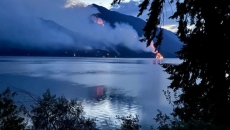An oil salvage operation is underway on the fragile wreckage of a U.S. army transport ship that sank almost 80 years ago off coastal British Columbia in a race to head off an eruption of thousands of litres of oil that a coast guard official says is "near imminent."
The Canadian Coast Guard said the 77-metre-long Brigadier General M.G. Zalinski has been burping up "slow but consistent drops of oil" since the fall of 2022 at the shipwreck site in Grenville Channel, part of the Inside Passage off northern B.C.
Jeff Brady, superintendent of marine environmental hazard response in the west for the coast guard, said the discovery comes after 44,000 litres of heavy fuel oil and 319,000 litres of oily water was successfully extracted from the sunken ship in 2013.
An assessment done by the coast guard last year suggests about 27,000 litres of oil remains within the ship, which sits on a rocky shelf about 40 meters below the surface.
Brady said the oil removal work is urgent.
“We're really well aware of that the marine mammals in the area, aquaculture, all the migratory birds.
“And what we do know about the wreck is that it's in a deteriorated state, and it's near imminent that we're going to have a more significant release from it, and that's why we're aggressively launching this operation,” said Brady.
Coast guard crews began diving down to the site — about 1,100 kilometres north of Vancouver along the coast — for more than a week to do safety checks and prepare it for oil removal work, he said.
Built in 1919 by the American Ship Building Co., the Zalinski was initially used as a cargo ship, and in 1941, it was taken over by the U.S. Department of War to an army transport vessel.
The Zalinski was on its way from Seattle to Whittier, Alaska, in 1946, loaded with army supplies and about 700 tonnes of fuel, when it crashed into rock near Pitt Island.
It sank in just 20 minutes, although the 48 crew members aboard were rescued by a nearby tug and a cargo ship.
Since then, Brady said the wreck has been "very slowly" spilling oil.
The sunken ship was mostly forgotten until around 2005, when oil was reported in the channel, he said.
“And during that dive, to our surprise, we found a large Second World War wreck and that really started this progress,” said Brady.
The federal government awarded a $4.9 million contract to U.S.-based company Resolve Marine in October to use an extraction method called "hot tapping" to remove the fuel, the coast guard said in a statement.
Brady said a crew has cut a 10-centimetre hole in the steel plate of the wreckage without spilling any of the oil inside.
“So, imagine you had an aboveground swimming pool, and on the side of that swimming pool you wanted to put a hole through that, but you didn't want to spill any water, and so that's a challenging thing to do,” said Brady.
Brady said the oil-removal operation, which will likely last into early November, is being done in collaboration with the nearby Gitga’at and Gitxaala First Nations and wildlife advisers.
Because the Zalinski sank before polluter-pay rules were established, the federal government is paying the $4.9-million cost of the operation.
The coast guard said in a statement that given the "high risk" to the marine ecosystem, and areas of “culture sensitivity” in Grenville Channel and other areas of the Inside Passage, the Government of Canada is paying for the removal of bulk oil.
The coast guard said the contractor will attempt to remove as much of the remaining oil as possible.
Once the operation is finished, Brady said the wreck will be left on the channel floor as it has "deteriorated significantly" with its bones collapsing, said Brady.
"We can't remove such a sensitive, fragile hull in one piece. And if we did decide to do that, we'd still know that there are little pockets of trace oil throughout the hull and it may not be best for the environment," said Brady.
"It might be a net environmental benefit to just leave the hull and let it deteriorate in place," he added.






